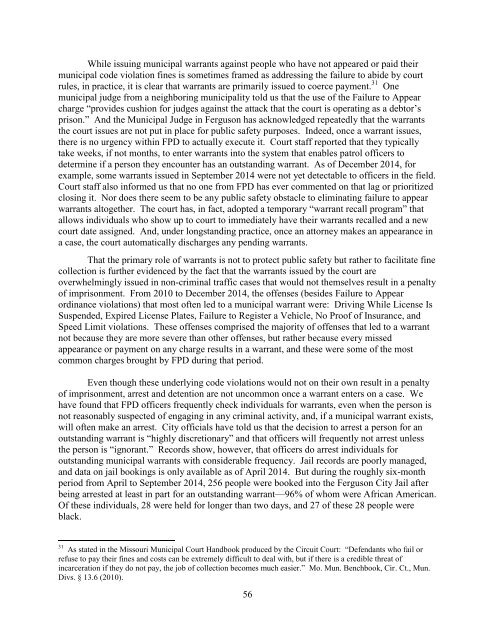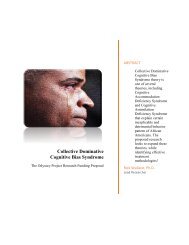U.S. Justice Department Report on the Ferguson Police Department
Ferguson’s law enforcement practices are shaped by the City’s focus on revenue rather than by public safety needs. This emphasis on revenue has compromised the institutional character of Ferguson’s police department, contributing to a pattern of unconstitutional policing, and has also shaped its municipal court, leading to procedures that raise due process concerns and inflict unnecessary harm on members of the Ferguson community.
Ferguson’s law enforcement practices are shaped by the City’s focus on revenue rather than by public safety needs. This emphasis on revenue has compromised the institutional character of Ferguson’s police department, contributing to a pattern of unconstitutional policing, and has also shaped its municipal court, leading to procedures that raise due process concerns and inflict unnecessary harm on members of the Ferguson community.
Create successful ePaper yourself
Turn your PDF publications into a flip-book with our unique Google optimized e-Paper software.
While issuing municipal warrants against people who have not appeared or paid <strong>the</strong>ir<br />
municipal code violati<strong>on</strong> fines is sometimes framed as addressing <strong>the</strong> failure to abide by court<br />
rules, in practice, it is clear that warrants are primarily issued to coerce payment. 31 One<br />
municipal judge from a neighboring municipality told us that <strong>the</strong> use of <strong>the</strong> Failure to Appear<br />
charge “provides cushi<strong>on</strong> for judges against <strong>the</strong> attack that <strong>the</strong> court is operating as a debtor’s<br />
pris<strong>on</strong>.” And <strong>the</strong> Municipal Judge in Fergus<strong>on</strong> has acknowledged repeatedly that <strong>the</strong> warrants<br />
<strong>the</strong> court issues are not put in place for public safety purposes. Indeed, <strong>on</strong>ce a warrant issues,<br />
<strong>the</strong>re is no urgency within FPD to actually execute it. Court staff reported that <strong>the</strong>y typically<br />
take weeks, if not m<strong>on</strong>ths, to enter warrants into <strong>the</strong> system that enables patrol officers to<br />
determine if a pers<strong>on</strong> <strong>the</strong>y encounter has an outstanding warrant. As of December 2014, for<br />
example, some warrants issued in September 2014 were not yet detectable to officers in <strong>the</strong> field.<br />
Court staff also informed us that no <strong>on</strong>e from FPD has ever commented <strong>on</strong> that lag or prioritized<br />
closing it. Nor does <strong>the</strong>re seem to be any public safety obstacle to eliminating failure to appear<br />
warrants altoge<strong>the</strong>r. The court has, in fact, adopted a temporary “warrant recall program” that<br />
allows individuals who show up to court to immediately have <strong>the</strong>ir warrants recalled and a new<br />
court date assigned. And, under l<strong>on</strong>gstanding practice, <strong>on</strong>ce an attorney makes an appearance in<br />
a case, <strong>the</strong> court automatically discharges any pending warrants.<br />
That <strong>the</strong> primary role of warrants is not to protect public safety but ra<strong>the</strong>r to facilitate fine<br />
collecti<strong>on</strong> is fur<strong>the</strong>r evidenced by <strong>the</strong> fact that <strong>the</strong> warrants issued by <strong>the</strong> court are<br />
overwhelmingly issued in n<strong>on</strong>-criminal traffic cases that would not <strong>the</strong>mselves result in a penalty<br />
of impris<strong>on</strong>ment. From 2010 to December 2014, <strong>the</strong> offenses (besides Failure to Appear<br />
ordinance violati<strong>on</strong>s) that most often led to a municipal warrant were: Driving While License Is<br />
Suspended, Expired License Plates, Failure to Register a Vehicle, No Proof of Insurance, and<br />
Speed Limit violati<strong>on</strong>s. These offenses comprised <strong>the</strong> majority of offenses that led to a warrant<br />
not because <strong>the</strong>y are more severe than o<strong>the</strong>r offenses, but ra<strong>the</strong>r because every missed<br />
appearance or payment <strong>on</strong> any charge results in a warrant, and <strong>the</strong>se were some of <strong>the</strong> most<br />
comm<strong>on</strong> charges brought by FPD during that period.<br />
Even though <strong>the</strong>se underlying code violati<strong>on</strong>s would not <strong>on</strong> <strong>the</strong>ir own result in a penalty<br />
of impris<strong>on</strong>ment, arrest and detenti<strong>on</strong> are not uncomm<strong>on</strong> <strong>on</strong>ce a warrant enters <strong>on</strong> a case. We<br />
have found that FPD officers frequently check individuals for warrants, even when <strong>the</strong> pers<strong>on</strong> is<br />
not reas<strong>on</strong>ably suspected of engaging in any criminal activity, and, if a municipal warrant exists,<br />
will often make an arrest. City officials have told us that <strong>the</strong> decisi<strong>on</strong> to arrest a pers<strong>on</strong> for an<br />
outstanding warrant is “highly discreti<strong>on</strong>ary” and that officers will frequently not arrest unless<br />
<strong>the</strong> pers<strong>on</strong> is “ignorant.” Records show, however, that officers do arrest individuals for<br />
outstanding municipal warrants with c<strong>on</strong>siderable frequency. Jail records are poorly managed,<br />
and data <strong>on</strong> jail bookings is <strong>on</strong>ly available as of April 2014. But during <strong>the</strong> roughly six-m<strong>on</strong>th<br />
period from April to September 2014, 256 people were booked into <strong>the</strong> Fergus<strong>on</strong> City Jail after<br />
being arrested at least in part for an outstanding warrant—96% of whom were African American.<br />
Of <strong>the</strong>se individuals, 28 were held for l<strong>on</strong>ger than two days, and 27 of <strong>the</strong>se 28 people were<br />
black.<br />
31 As stated in <strong>the</strong> Missouri Municipal Court Handbook produced by <strong>the</strong> Circuit Court: “Defendants who fail or<br />
refuse to pay <strong>the</strong>ir fines and costs can be extremely difficult to deal with, but if <strong>the</strong>re is a credible threat of<br />
incarcerati<strong>on</strong> if <strong>the</strong>y do not pay, <strong>the</strong> job of collecti<strong>on</strong> becomes much easier.” Mo. Mun. Benchbook, Cir. Ct., Mun.<br />
Divs. § 13.6 (2010).<br />
56

















